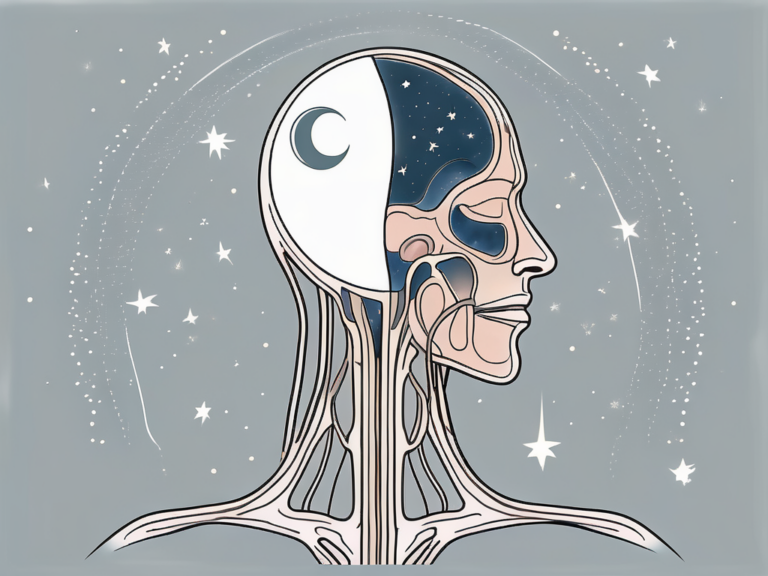Parasympathetic Nerves and Sleeping
As someone who has struggled with sleep issues for years, I know firsthand how important it is to understand the role of parasympathetic nerves in the sleep process. It’s fascinating to delve into the science behind sleep cycles and how these cycles are influenced by our parasympathetic nervous system. In this article, we will explore the connection between parasympathetic nerves and sleep, the impact of sleep on our parasympathetic nervous system, common sleep disorders related to parasympathetic activity, and techniques for improving sleep through parasympathetic nervous system regulation. Let’s dive in!
Understanding the Parasympathetic Nervous System
The parasympathetic nervous system is a crucial division of the autonomic nervous system, responsible for regulating a myriad of involuntary bodily functions. Unlike its counterpart, the sympathetic nervous system, which triggers our fight-or-flight response, the parasympathetic nerves help promote a state of relaxation and rest. It essentially serves as the body’s “rest and digest” system, ensuring that our body’s resources are conserved and replenished.
When we delve deeper into the intricacies of the parasympathetic nervous system, we uncover a fascinating network of nerves that work harmoniously to maintain our physiological equilibrium. These intricate pathways facilitate communication between the brain and various organs, orchestrating a symphony of responses that keep our body functioning optimally.
The Role of the Parasympathetic Nervous System
In the context of sleep, the parasympathetic nervous system plays a pivotal role in initiating and maintaining a state of relaxation. It helps lower our heart rate, dilate our blood vessels, and activate digestive processes. When we are in a parasympathetic dominant state, it becomes easier for us to fall asleep and enjoy a more peaceful slumber.
Furthermore, the parasympathetic nervous system is not solely active during sleep; it also influences our overall well-being during wakefulness. By fostering a state of calm and tranquility, this system aids in reducing stress levels and promoting digestion, contributing to our overall health and vitality.
Key Components of the Parasympathetic Nervous System
To truly grasp how parasympathetic nerves contribute to our sleep and overall health, it’s imperative to delve into the key components of this intricate system. The main players are the vagus nerve and the sacral nerves. The vagus nerve, also known as the wandering nerve, is a remarkable cranial nerve that meanders through the body, influencing various bodily functions such as heart rate regulation and digestion. On the other hand, the sacral nerves, originating from the lower spinal cord, intricately innervate the pelvic organs, exerting control over essential functions like bladder and bowel movements.
Together, these components of the parasympathetic nervous system form a sophisticated network that ensures our body can rest, digest, and rejuvenate effectively, highlighting the intricate balance of our autonomic nervous system.
The Connection Between Parasympathetic Nerves and Sleep
Now that we have a better understanding of the parasympathetic nervous system, let’s explore how it influences our sleep patterns.
How Parasympathetic Nerves Influence Sleep
During the onset of sleep, parasympathetic activity increases, promoting a state of relaxation in our bodies. This increased activity helps slow down our heart rate, decrease muscle tension, and enhance digestive functions. As a result, we feel more calm and at ease, paving the way for a peaceful slumber. However, it’s worth noting that while the parasympathetic system is essential for falling asleep, it becomes less dominant during the REM (rapid eye movement) stage of sleep when vivid dreaming occurs.
Furthermore, the parasympathetic nervous system plays a crucial role in regulating our body’s circadian rhythm, also known as the sleep-wake cycle. This intricate system helps synchronize our internal body clock with external cues such as light and darkness, ensuring that we feel alert during the day and sleepy at night. Disruptions to this rhythm, such as irregular sleep patterns or jet lag, can impact the functioning of the parasympathetic nerves, leading to difficulties in falling asleep and staying asleep.
The Impact of Sleep on the Parasympathetic Nervous System
Just as parasympathetic nerves influence our sleep, our sleep also has an impact on the parasympathetic nervous system. Adequate and quality sleep helps restore and rejuvenate our body, optimizing the functioning of the parasympathetic system. On the other hand, sleep deprivation can disrupt the delicate balance of our autonomous nervous system, leading to decreased parasympathetic activity and increased sympathetic activity. This imbalance can result in heightened stress levels, impaired digestion, and compromised immune function.
Moreover, deep sleep stages, such as slow-wave sleep, are particularly important for parasympathetic nervous system recovery. During these stages, the body focuses on repairing and rebuilding tissues, supporting overall health and well-being. Therefore, prioritizing a consistent sleep schedule and creating a relaxing bedtime routine can help enhance parasympathetic function and promote better sleep quality.
The Science Behind Sleep Cycles
Now that we’ve explored the role of parasympathetic nerves in sleep, let’s delve into the fascinating world of sleep cycles. Understanding the intricate mechanisms that govern our sleep patterns can provide valuable insights into optimizing our rest and overall well-being.
When we talk about sleep cycles, we are referring to the recurring stages that our brains and bodies go through while we are asleep. These cycles are crucial for various physiological processes, including memory consolidation, hormone regulation, and cellular repair. By delving deeper into the complexities of sleep cycles, we can unravel the mysteries of why we need sleep and how it impacts our daily functioning.
Understanding Sleep Stages
Sleep is classified into different stages, which collectively make up a sleep cycle. The sleep cycle consists of non-rapid eye movement (NREM) stages 1, 2, and 3, followed by the REM stage. Each stage has unique characteristics and plays a vital role in our overall sleep quality and well-being.
During NREM stage 1, our bodies start to relax, and our brain waves begin to slow down as we drift from wakefulness into light sleep. In NREM stage 2, our body temperature drops, and our heart rate slows as we prepare to enter deep sleep. NREM stage 3 is the deepest sleep stage, where the body focuses on repairing tissues, boosting immune function, and releasing growth hormones. Finally, the REM stage is where most dreaming occurs, and our brains are highly active, almost mirroring our wakeful state.
The Role of Parasympathetic Nerves in Each Sleep Stage
Throughout the different sleep stages, parasympathetic nerves continue to exert their influence. During NREM stage 1, parasympathetic activity increases, contributing to the relaxation of our muscles and the initial transition into sleep. As we progress into deeper NREM stages, the parasympathetic system helps maintain our relaxed state, ensuring that we reap the benefits of restorative sleep. In the REM stage, parasympathetic activity decreases, allowing us to experience vivid dreams while our brain activity increases.
Sleep Disorders and the Parasympathetic Nervous System
Unfortunately, sleep disorders are a common reality for many individuals, and they can have a significant impact on parasympathetic nervous system activity.
Sleep is a complex physiological process that involves various stages, including rapid eye movement (REM) and non-REM sleep. During these stages, the parasympathetic nervous system plays a crucial role in promoting relaxation, slowing the heart rate, and aiding in digestion. Disruptions in this system can lead to a host of sleep disorders that affect the quality and quantity of our rest.
Common Sleep Disorders Linked to the Parasympathetic Nervous System
One of the most well-known sleep disorders, sleep apnea, can disrupt the functioning of our parasympathetic nervous system. Sleep apnea is characterized by the temporary cessation of breathing during sleep, leading to fragmented sleep and decreased parasympathetic activity. Other sleep disorders, such as insomnia and restless leg syndrome, can also negatively affect our parasympathetic system, making it more challenging to achieve restful sleep.
Moreover, conditions like narcolepsy, which involve excessive daytime sleepiness and sudden loss of muscle tone (cataplexy), can also impact the parasympathetic nervous system. These disruptions can further exacerbate the challenges faced by individuals already struggling with sleep disorders, creating a cycle of sleep deprivation and impaired parasympathetic function.
The Effect of Sleep Disorders on Parasympathetic Activity
When sleep disorders compromise our parasympathetic nervous system, we may experience daytime fatigue, difficulty concentrating, and overall reduced quality of life. It’s crucial to identify and address these sleep disorders to restore optimal parasympathetic activity and promote healthy sleep patterns.
By seeking medical intervention, implementing lifestyle changes, and practicing good sleep hygiene, individuals can work towards improving their parasympathetic function and overcoming the challenges posed by sleep disorders. Prioritizing restorative sleep is essential not only for physical health but also for mental well-being and overall quality of life.
Improving Sleep Through Parasympathetic Nervous System Regulation
Now that we understand the connection between parasympathetic nerves and sleep, let’s explore some techniques for enhancing parasympathetic activity and promoting better sleep quality.
Quality sleep is essential for overall well-being, affecting everything from cognitive function to immune health. Understanding the role of the parasympathetic nervous system in promoting restful sleep can provide valuable insights into optimizing our sleep habits.
Techniques for Enhancing Parasympathetic Activity
One effective technique for activating the parasympathetic nervous system is deep breathing exercises. By focusing on slow, deep breaths, we can stimulate the vagus nerve, encouraging relaxation and calming our mind and body. Other practices, such as meditation, progressive muscle relaxation, and aromatherapy, can also help activate the parasympathetic system and promote a more peaceful sleep environment.
Creating a bedtime routine that incorporates these techniques can signal to your body that it’s time to wind down and prepare for sleep. Consistency is key when it comes to reaping the benefits of parasympathetic activation for improved sleep quality.
The Future of Sleep Improvement: Parasympathetic Nervous System Research
As research into the fascinating world of sleep continues to evolve, scientists are exploring innovative ways to improve sleep quality through parasympathetic nervous system regulation. From biofeedback devices to novel therapeutic interventions, the future holds promise for individuals seeking better sleep and enhanced parasympathetic activity.
By delving deeper into the intricate mechanisms of the parasympathetic nervous system and its impact on sleep, researchers aim to uncover new strategies for addressing sleep disorders and enhancing overall sleep health. The intersection of neuroscience, technology, and holistic wellness offers a wealth of possibilities for unlocking the full potential of the parasympathetic system in promoting restorative sleep.
Conclusion
In conclusion, understanding the role of parasympathetic nerves in sleep is key to achieving restful and rejuvenating nights. By harnessing the power of the parasympathetic nervous system through various techniques and prioritizing healthy sleep habits, we can enhance our sleep quality and overall well-being. Remember, it’s crucial to consult with healthcare professionals to address any underlying sleep disorders and ensure tailored guidance for optimal results. Here’s to peaceful nights and energized mornings!






